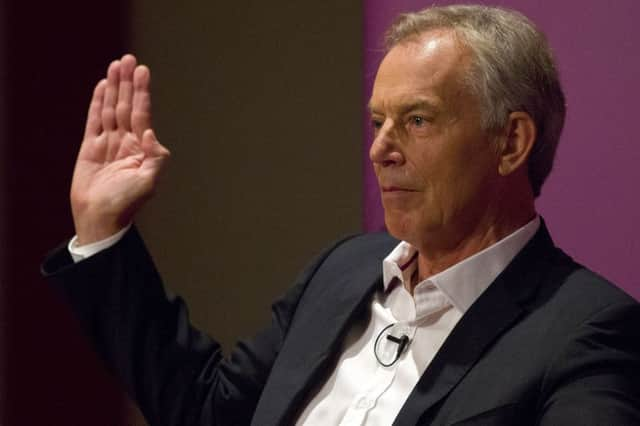Leaders: Tony Blair isn’t the great leader he’s cracked up to be


So it seems there is an unanswerable case for Labour to listen to him then, but is it really that straightforward?
Labour had begun to reform under Neil Kinnock and after the fourth election defeat John Smith took over the reins and carried on with the reform, in fact faring better than Kinnock had in restoring the party’s fortunes and credibility. At the same time the Tories were begining to implode complete with a sterling crisis. Smith’s untimely death came before a general election and the baton was passed to Tony Blair. But make no mistake, the tide was already turning for Labour.
Advertisement
Hide AdAdvertisement
Hide AdIn the 2010 general election Labour won the second largest number of seats, 258, and the Tories were on 307 but no party had an overall majority, meaning that Labour could still remain in power if it managed to form a coalition. Labour failed to do so and Gordon Brown quit as leader and prime minister, but it was a narrow defeat.
It has widely been held that Labour was hammered in May this year, holding just 232 seats – down from 258. But the truth is that the party saw a 1.5 per cent jump in its share of the national vote.
By far the biggest blow to hit Labour in May was the SNP gaining 56 out of Scotland’s 59 Westminster seats leaving Labour with only one, an amazing transformation in what had been a solid Labour fiefdom.
But if you remove Scotland from Labour’s performance, it is not a picture of an abysmally failing party on the ropes. And there can be no doubt that Labour was caught up in the Nationalist surge, in an appetite for change in Scotland, that was not reflected elsewhere in the UK.
So Tony Blair is not perhaps the guru of single-handed success he is held up to be. He continued Labour’s move to the centre and became the poster boy for that tactic, but that really was a pragmatic view of politics, probably the very opposite of conviction politics.
There is undeniable logic in the position that a party in power has the best opportunity to shape society according to its views, but if it has to be all things to all people it must shed a lot of those views.
Yesterday Mr Blair warned party members against following their hearts in a vote for Jeremy Corbyn. But following hearts and doing the right thing were never lessons learnt by Mr Blair, and the country, and his party, are the poorer for it. We need more honest conviction and less strategic positioning in British politics.
Take two for dementia drug hope
Alzheimer’s disease is cruel. The loved ones of those who suffer from it still see the person they love, but that person changes in a way that causes huge hurt and frustration.
Advertisement
Hide AdAdvertisement
Hide AdThe disease is one of the main causes of dementia. By the end of this year more than 850,000 people in Britain will suffer from dementia, by 2025 that figure will rise to above one million.
Putting aside the terrible human cost, the cost to the UK is £26 billion a year. The proportion of people with dementia doubles for every five-year age group. Currently 60,000 deaths a year are directly attributable to dementia. Tellingly, delaying the onset of dementia by five years would reduce deaths directly attributable to the condition by 30,000 a year.
That is why the success of the trial of a new drug holds such promise. Data from pharmaceutical company Eli Lilly suggests its solanezumab drug can cut the rate of dementia’s progression by about a third in sufferers in the early stages. Any delay would be a great boon.
Over the past 30 years there have been more than 100 trials of drugs that could tackle Alzheimer’s, but the silver bullet has never been found. Current treatments can only manage the symptoms. The discovery of this new hope speaks of the tenacity of the researchers. There was previously much hope for it but an 18-month trial involving long-term sufferers ended in failure in 2012. But, re-examining the data, they saw more hope for early stage sufferers. They are to be congratulated, and it is to be hoped their tenacity pays off, as it could have a huge impact on many lives.